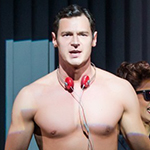Single Room Occupancy
(part of The NY Int’l Fringe Festival)
Lynn Redgrave Theater at Culture Project
45 Bleecker Street, NYC, August 14, 2015
Reviewed by Rob Lester for Cabaret Scenes
 The name Ben Rauch was familiar to me from almost 10 years ago in my cabaret travels. He was a quirky guy who created a quirkier, nerdy character named Horace Vanderveer, staying in character as the oddball throughout his presentations. He seemed to disappear from the cabaret radar, so I was happy and not surprised to see he was making a place for himself in theater. Thus, I chose his show as one of those I’d see out of the nearly 200 events in the annual August Fringe Festival. The likeable and talented Rauch is not only the star of the show, but plays keyboards for some numbers and wrote the book, music and some of the lyrics for his musical, Single Room Occupancy.
The name Ben Rauch was familiar to me from almost 10 years ago in my cabaret travels. He was a quirky guy who created a quirkier, nerdy character named Horace Vanderveer, staying in character as the oddball throughout his presentations. He seemed to disappear from the cabaret radar, so I was happy and not surprised to see he was making a place for himself in theater. Thus, I chose his show as one of those I’d see out of the nearly 200 events in the annual August Fringe Festival. The likeable and talented Rauch is not only the star of the show, but plays keyboards for some numbers and wrote the book, music and some of the lyrics for his musical, Single Room Occupancy.
It’s rather a mixed bag. He’s an energetic, imaginative performer to be sure, quite endearing even in scenes that test one’s patience when the accompaniment overpowers vocals so that one can’t hear lyrics well and in a theater that wasn’t at all cool enough to be comfortable in for a show of any length on a 90+ degree day. The performers all carried on admirably. The hit-and-miss material that isn’t quite enough to add up to a surefire hit show or one to definitely miss seemed like a bunch of pretty good ideas and a few weaker ones hopscotching around among various plot ideas. The title and an early scene/set-up leads us to believe it will focus on the claustrophobia of NYC apartments. That might have worked, despite the perhaps too-wide stage and minimal scenery. But it then veered off that course to be more about contemporary relationships and technology’s new apps for meeting up. The all-over-the-place story jumps from dating among the self-absorbed and commitment-phobic, to workplace scenes involving the daters and their friends, the friendships among them, their other attractions and obsessions and habits, with tones ranging from believable to broader and less realistic.
This diffused focus meant that the play often resembled a series of loose sketches and songs too loosely tied together, with characters not sufficiently real or sympathetic or fleshed out to engage us fully. But it has some nifty moments. Cali Elizabeth Moore is often quite funny as the on again/off again girlfriend of the limited attention span who’s not so smart, checking her Smart Phone for messages about other dates and such while the bubbly Matthew (Rauch) sings a song he wrote for her. A funny running bit is her always being late, saying that it’s her trademark thing, as if that makes it OK. These two are consistently watchable, whether whining, pining, sighing or justifying their behavior.
A trio of improv actors who work in a club with Matthew as musical director too shy to present his non-improv songs doesn’t have the payoff needed for the time it takes. (Perhaps confusingly, the show opens with these characters presenting their act, eliciting suggestions for subjects from the real audience—treated as a comedy club’s crowd. The “instant song” bits were too repetitive and bland to be remarkable at the performance I saw.) But some other numbers showed real polish, like the one set in a gluten-free bakery about wheat allergies, which is fun and timely. Another, about a stripper’s back problems, would be more amusing if she were more ironic or sounded like she was struggling more, rather than cavorting, shimmying, and striking poses. One-joke songs are dangerous. And another, about Matthew’s worship of pop star Phil Collins (who his girlfriend never heard of) is savvy, incorporating titles of Collins’s hits. But I was hoping/expecting there’d be more of a reason for the piece to be part of the plot. (Rory Scholl—who is also in the cast—or Gaby Gold are co-credited with half the score’s lyrics, the other half are all Rauch.) Jebbel Arce’s choreography enlivens things, but depends too much on similar contemporary moves and jivey struts. Joey Murray’s direction keeps scenes moving fairly briskly, but there are some that lag, and all concerned seem unwilling to truly give the piece heart, preferring glib and smug armor over feelings.
Pianist Noriko Sunamoto is musical director, seemingly especially joyful throughout, yet in command of her fellow musicians as a unit. It’s a shame that the acoustics or volume controls and mixing made it difficult to catch quite a few lyrics. An improv actor playing an improve actor and a songwriter playing a songwriter may mean that some perspective is lost, and some songs feel like pre-existing material shoehorned in. With a much-tightened focus and pruning, the show has some potential as a real play with a throughline. Or maybe it does need to be a revue without that structure, allowing the cast to play a range of characters with self-contained and separate sketches. For now, Single Room Occupancy has room for improvement before it occupies a theater again. But this is its world premiere and a musical play needs to find its way sometimes. There is definitely talent here and what works does work quite well.
See www.fringenyc.org for the full schedule of this season’s shows. The Festival ends August 30.





